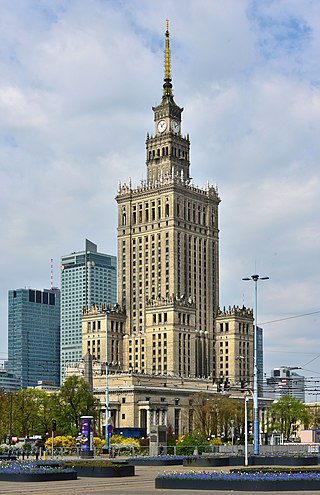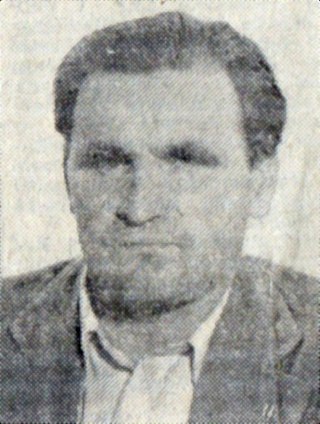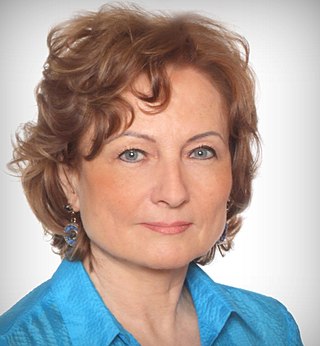Izabela Zubko (born 2 June 1974) is a Polish poet.
Izabela Zubko (born 2 June 1974) is a Polish poet.
She was born in Warsaw, raised in Dęblin, Poland. She graduated from Literary-Artistic studies at the Faculty of Polish Studies at Jagiellonian University in Cracow. She is a member of the Polish Writers’ Union (Związek Literatów Polskich), the Polish Authors’ Association of the 2nd Warsaw Branch (Stowarzyszenie Autorów Polskich), a literary-musical group “Terra Poetica [1] ”, and the Association of Culture Originators in Warsaw (Warszawskie Stowarzyszenie Twórców Kultury).
Her poems were translated into languages: Ukrainian, Lithuanian, Russian, English, French, Telugu, Hungarian. Her works are present in many anthologies, including international collections, among others: Poeci naszych czasów (The Poets of our Times) and Anthology of Slavic Poetry. Her name can be found in Mini-słownik biograficzny polskich współczesnych poetów religijnych (Biographical Mini-Dictionary of the Polish Modern Religious Authors).
A musical composition inspired by her poem Romantyka [2] (Romanticism) became a musical showpiece of “Neoclassic” duet. In 2007 Aleksander Chodakowski, the composer, and Natalia Miżygórska, the singer, were awarded the prize of the Polish Ambassador in Ukraine for this musical piece. They represented Ukraine with this song during the International Poetry Festival named after Maria Konopnicka in Przedbórz. Izabela Zubko's poems arranged by Michał Pastuszak are being sung by the participants of vocal workshops in the Culture Center in Dęblin and by singer Alina Małachowska.
During the years of 2007–2017 Izabela Zubko was a member of the editorial team of Myśl Literacka [3] (Literary Thought), the supplement in weekly magazine Myśl Polska [4] (Polish Thought). In 2017 she started working in Metafora Współczesności (The Metaphor of Contemporariness), the periodical of the international literary group Kwadrat (The Square). She is actively cooperating with a social-cultural magazine Własnym Głosem (With my own Voice) published by the Workers’ Association of Culture Originators (Robotnicze Stowarzyszenie Twórców Kultury).

The Palace of Culture and Science is a notable high-rise building in central Warsaw, Poland. With a total height of 237 metres (778 ft), it is the second tallest building in both Warsaw and Poland, the sixth tallest building in the European Union and one of the tallest on the European continent. At the time of its completion in 1955, the Palace was the eighth tallest building in the world, retaining the position until 1961; it was also briefly the tallest clock tower in the world, from 2000 until the 2002 installation of a clock mechanism on the NTT Docomo Yoyogi Building in Tokyo, Japan.
Tadeusz Różewicz was a Polish poet, playwright, writer, and translator. Różewicz was in the first generation of Polish writers born after Poland regained its independence in 1918, following the century of foreign partitions. He was born in Radomsko, near Łódź, in 1921. He first published his poetry in 1938. During World War II, he served in the Polish underground Home Army. His elder brother, Janusz, also a poet, was executed by the Gestapo in 1944 for serving in the Polish resistance movement. His younger brother, Stanisław, became a noted film director and screenwriter.

Wacław Iwaniuk. Educated in Warsaw and Cambridge, England, a poet, literary critic and essayist for various Polish émigré newspapers in Canada and abroad. He served in the Polish Diplomatic Corps and as an officer in the Polish Armed Forces during World War II. Iwaniuk immigrated to Canada in 1948 (Toronto) where he continued to write and published in Polish. He was a member of several international literary societies (PEN) and writers unions. During his career as a postwar émigré poet and writer, he had published numerous articles and publications including in popular Polish Kultura paryska.

Grzegorz Motyka is a Polish historian and author specializing in the history of Poland–Ukraine relations. Since 1992 he served at the Institute of Political Studies of the Polish Academy of Sciences and at the Institute of National Remembrance.
The Polish Center for Holocaust Research is an academic and research center at the Polish Academy of Sciences in Warsaw, Poland. The center's director is historian Barbara Engelking.

Albin Siwak was a Polish politician, construction worker and a social activist, who acted as a government sponsored antagonist of opposition leader Lech Wałęsa during the 1980s. Later in his career, Siwak held nationalist and anti-semitic views, arguing that Solidarity was a Jewish conspiracy.

Małgorzata (Margo) Rejmer, born in 1985 in Warsaw, is a Polish novelist, reporter, and writer of short stories.

Lucyna Kulińska is a Polish historian specializing in modern history and university lecturer. She has authored several books, collections of documents, publications and articles on the subject of Polish-Ukrainian relations, globalization and international relations. Lucyna Kulińska is the chairwoman of Społeczna Fundacja Pamięci Narodu Polskiego.

Bozenna Intrator is a Polish-American writer, lyricist and translator.
Edward Kopówka is a Polish writer and historian, graduate of the Faculty of History at the Podlasie Academy in Siedlce, political and social activist known for his active participation in the democratic process beginning with the so-called Second circulation publishing of delegalized books under the Communist rule. Following the imposition of Martial law in 1981 Kopówka became member of the Independent Students' Union branch of Solidarity, the first non–communist workers union in Warsaw Pact history. In 1985–88 he served as founder, editor-in-chief and production manager for the unofficial Grzegorz Przemyk Publishing named after the young Polish poet murdered by the Communist Milicja Obywatelska. Kopówka supported himself financially by working as history teacher at elementary schools in Siedlce and its vicinity, and after the fall of communism, as clerk at the Office for Financial Control in 1993–96. Kopówka received his Ph.D degree in 2009. He is the Senior Curator of the Treblinka extermination camp museum in Treblinka with certification from the Ministry of Culture. In 2011 he was awarded the Knight's Cross of the Order of Polonia Restituta, one of Poland's highest honours.

Zofia Posmysz-Piasecka was a Polish journalist, novelist, and author. She was a resistance fighter in World War II and survived imprisonment at the Auschwitz and Ravensbrück concentration camps. Her autobiographical account of the Holocaust in occupied Poland, Passenger from Cabin 45, became the basis for her 1962 novel Passenger, subsequently translated into 15 languages. The original radio drama was adapted for an award-winning feature film, while the novel was adapted into an opera of the same name with music by Mieczysław Weinberg.

Gabriela Matuszek-Stec is a Polish literary historian, essayist, critic and translator of German literature.
Edmund Wacław Naganowski, was a Polish publicist and writer also known under pen names E. Działosz, Latarnik and Edmund Sas.

Anna Janko, is a Polish poet, writer, columnist and literary critic.

Norbert Bogdan Redkie is a Polish entrepreneur, restaurateur, lecturer, and film producer. He is a co-founder of a restaurant company Grupa Warszawa, which runs local clubs, bars, and restaurants in Warsaw, and produces feature films in a production studio Mental Disorder 4.

Anna Frajlich, known also as Anna Frajlich-Zając, is a Polish-American poet and a Senior Lecturer Emerita at the Department of Slavic Languages and Associate Faculty Member, Harriman Institute at Columbia University in New York City, where she taught Polish language and literature for over three decades.
Mariola Grażyna Antczak is a Polish bibliologist and informatologist, associate professor and head of the Department of Information, Library and Book Studies at University of Łódź.

Poles in Buryatia form part of the Polish diaspora in Siberia. Polish presence in Buryatia dates back over 300 years.

Antoni Matuszkiewicz is a Polish poet, prose writer, playwright, journalist, and promoter of literary life. As a poet, he expresses himself in a modern and, at the same time, spiritual manner.
{{citation}}: CS1 maint: numeric names: authors list (link){{cite book}}: CS1 maint: location missing publisher (link)